#sixteenth minute (of fame)
Explore tagged Tumblr posts
Text
I highly recommend this podcast from Jamie Loftus where she takes deeper dives into the internet's main characters. The episode about 30-50 ferral hogs guy has been my favorite so far!

IT'S 30-50 FERAL HOGS DAY
it's 30-50 feral hogs day
It's 30-50 feral hogs day
‼️‼️‼️‼️‼️‼️‼️‼️‼️
144 notes
·
View notes
Text
just had a minute where i was like "maybe i should try to see what my shitty ex friends from middle/high school are up to now" but then i remembered im 25 and i have better things to do. like make dinner and listen to music and also the newest episode of sixteenth minute of fame and watch some northern exposure and do my crochet ^_^
7 notes
·
View notes
Text
The last 6 minutes or so of this podcast episode had me ugly crying in my car (but that might be because I have a parasocial relationship with Jamie Loftus).
anyway, good discussion of complicated grief feelings especially those regarding the loss of a loved one
3 notes
·
View notes
Text
linking to the sixteenth minute (of fame) episode on this. I think it's a great example of the urban - rural chasm, which we can see just by looking through the tags (one person even claimed hogs only exist in africa???) or the tweets (the suggestion that a fence is an obvious solution). The episode includes an interview with William McNabb, and while people have a wide variety of beliefs about gun access (which the episode doesn't really get into), it's worth thinking about how so many of the people dunking on him because they thought he was a moron were actually the ones ignorant of the experiences and lives of people different than them.
plus, the host speaks with an expert who discusses how hogs have become this exotic, invasive species destroying peoples' livelihoods. (not to be confused with animals like javelinas, which are native to places like my home in the sonoran desert and should continue to exercise their right to destroy all golf courses). one thing he highlights is that he sees hogs bigger than bears in Texas, and while they're not the big bears of northern climates, they're still well over 300 lbs and cause a lot of ecological and economic damage.
I love the perspective of this podcast and the opportunity to see more context, especially when the punchline drifts further away from the initial critique.

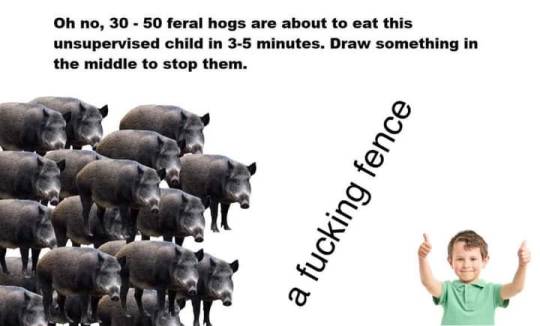
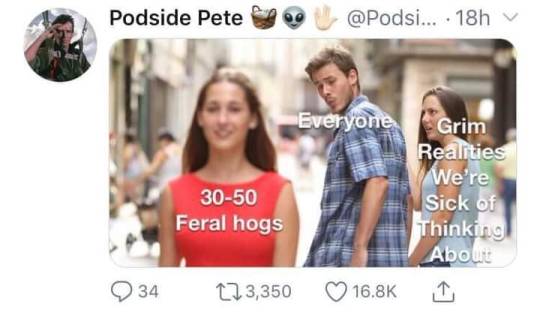

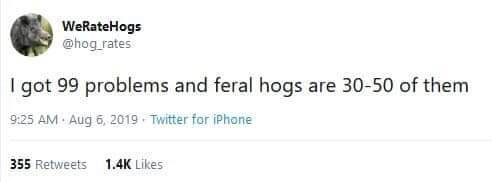
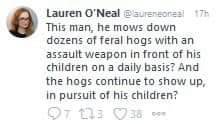


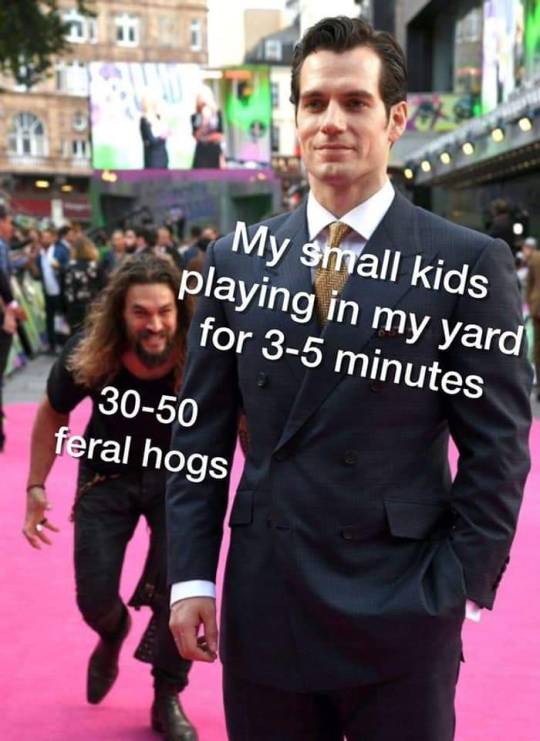
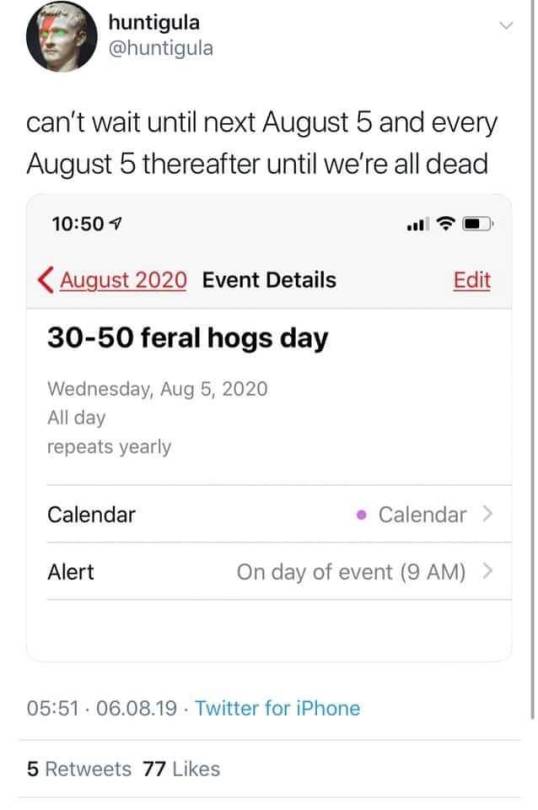
105K notes
·
View notes
Text
In 2017, Robbie Tripp posted an over-the-top message on Instagram about how much he loves his “curvy wife,” Sarah. “There is nothing sexier than this woman right here. Thick thighs, big booty, cute little side roll, et cetera,” he wrote.
Podcaster Jamie Loftus tells the story of the post and the wave of Internet discourse that followed.
Loftus explains that Robbie is an example of an Internet character called “the wife guy”—someone who doesn’t just proclaim his love for his wife online, but someone for whom “telling people how much he loves his wife appeared to be part of his job.”
The Tripps are both Internet influencers and content creators, and Robbie, at least, has built a little media business on the “curvy wife” meme.
My thoughts about this are complicated. It’s very hard for me to avoid judging the Tripps harshly — which is wrong of me. Loftus sums it up: “Pathologizing someone else’s marriage is 10 miles of none of your fucking business.”
Loftus does wonderful podcasts on odd corners of culture. This episode is part of a series about people who become Internet-famous — the “main character” of social media — for a short time, and lived with the repercussions for years, for better or worse. Loftus tells their human stories. The series is called “Sixteenth Minute of Fame.”
Another Loftus podcast, “The Lolita Podcast,” looks at the Nabokov novel, which she describes as basically a horror novel about a pedophile who destroys a young girl’s life. But the novel lives on as creepy erotica, with the girl portrayed as predator rather than victim, turning us all into Humbert Humbert.
Another great podcast by Loftus: “My Year in Mensa.”
2 notes
·
View notes
Text
Since this story somewhat recently went viral on here, Sixteenth Minute of Fame did an episode about it. You should take a listen.

2 notes
·
View notes
Text
another genius podcast concept from Jamie Loftus, she cannot miss
#her empathy and the way she gets people to talk in depth with her….. so truly inspiring to me#if you haven’t listened to my year in Mensa or Lolita podcast go do that immediately#Spotify
3 notes
·
View notes
Photo

i just now realized that's *the* homer hickam that the movie, October Sky, is based on.
also journalist and author Jamie Loftus recently covered the event as well as interviewed Naomi H

twitter is incredible
191K notes
·
View notes
Text
I'm so glad Naomi "Suck my dick and balls" H is doing well and has a job in aerospace engineering now.
0 notes
Text
please listen to this.
0 notes
Text
Media Recommendations
Some stuff I've read/watched/listened to recently and can recommend. YMMV. Includes accessibility notes.
The Madwoman of Chaillot (film) A 1960s film adaptation of a 1940s stage play about some eccentric widows and old maids dealing with a group of investors who want to destroy their neighborhood in Paris by drilling for oil. It's rated G for some reason even though there are several murders. Heavily implied murders, anyway. Official DVD release does not have captions/subtitles but the sound mixing is of the type where I could understand most of the dialog. There is a Deaf character who signs but I don't know if it's real ASL, French Sign Language/LSF, or something fake that was made up for the play and/or movie.
Sixteenth Minute of Fame (podcast) A podcast by Jamie Loftus and Cool Zone Media about what happens to people after being the Main Character of the Internet. The first two episodes are about Kevin Antoine Dodson and Kelly Dodson, the siblings you may remember from the Autotune The News "Bed Intruder" song of 2010. Content warning for child abuse/neglect including sexual abuse and sex trafficking of children. The audio is rough in several parts and while there is a transcript available, it appears to be auto-generated and full of errors that were not proofread/corrected.
0 notes
Text

smiling so wide and clapping with glee
29K notes
·
View notes
Text
Jamie Loftus' new podcast is up!
0 notes
Photo

12 Muslim Artists To Listen to on Muslim Women’s Day Whether you’re a hip-hop historian or a casual listener that’s heard an Arabic word or two in a Drake song, it’s hard to miss Islam’s influence on hip-hop, and, by extension, R&B. Poetry culture was popular in pre-Islamic Arabia. Poetry battles complete with creative insults (naqa'id) were commonplace and bore resemblance to battle rap culture. Rhymed Arabic poetry was fifteen meters; Al-Akhfash al-Akbar later identified a sixteenth meter. Hip-hop verses – 16 bars – are similar in theory. Upon the arrival of Islam, poetry retained its cultural significance, with the work of Muslim poets such as Hafez, Rumi and Omar Khayyam still relevant today. Much like hip-hop, their work spoke to the cultural, social and political climate of the time. None — (@) During the slave trade, large numbers of Muslims were enslaved and trafficked into the United States. Despite attempts to forcibly strip them of it, many held on tightly – and spread – their faith. Black Islam continued to influence generations of artists, including some of hip-hop’s pioneers like Afrika Bambaata and the Zulu Nation, Rakim, Public Enemy, Brand Nubian and other legends in the game whose protest rap was inspired by teachings from the Nation of Islam and Five Percenters. As educator and historian Zaheer Ali tweeted, “Because you can’t talk about Hip Hop without talking about Black Islam, which has shaped Black music from blues to jazz to R&B.”In honor of Muslim Women’s Day, we’re showcasing 12 talented Muslim artists (masha’Allah!) that deserve a spot on your playlist – and asked a few how their faith impacts their work. 1. SZASongstress SZA was born to a Muslim father and a Christian mother. She was raised Muslim and pays homage to Islam in her stage name. SZA is an acronym derived from the Supreme Alphabet that stands for “Sovereign Zig-Zag Allah.” The Grammy Award-winning artist told MuslimGirl.com that she realizes spirituality is “super-individualized,” elaborating that “everybody’s journey with God, source, spirit, Allah, whatever you want to call it, is very personal.” She reflects that she did wear a hijab at one point but removed it due to fears about the sociopolitical environment in a post-9/11 world. 2. ABIRAbir Haronni, known professionally as ABIR, was born in Fez, Morocco, arriving in the United States at age five. Young Abir’s penchant for song began soon after the family settled in Arlington, Virginia, when she would listen to Etta James with her father, a chauffeur. Her singing career began with her doing guest vocals for rappers like Fabolous. Within a few years, she made her debut as a solo artist with the song “Wave” and made waves internationally representing Morocco in the Europa Song Contest.Abir tells PAPER that her faith “permeates every aspect of my life and work. It’s in the brief minutes before I take the stage when my team and I recite a surah to bless the show and audience, it’s in the lyrics I compose in my songs that remind me of my faith and God and what a beautiful connection. It makes me feel protected and loved at my best and worst moments.”3. DouniaMoroccan-American Dounia’s original claim to fame was being an Instagram model known for body positivity and thrifting. Dounia’s otherworldly charm helped catch the eyes of the right brands and people, and instead, she ended up working as a professional model for major companies like Forever 21 and Refinery29 before launching her music career.Dounia credits her culture – and Islam – as being formative for her as both an artist and a person. “Growing up with a foundation in God is something I’ve always appreciated,” she says. “My mother always had this trust in a greater divine force; a trust which I’ve also continuously leaned on in music, career, and life in all facets. I remember the daily prayer in my childhood home in Morocco, breaking fasts with a large family, and the energy of love, comfort, and authentic laughter. More than anything, these moments represent a culture that shaped me into the unique human and artist I am today.”4. NeelamNeelam Hakeem is the first Black Muslim woman rapper to be featured in Vogue Arabia. Born in Seattle, Neelam moved to LA, where she currently lives, at the age of 15. She reverted to Islam in 2007. Neelam’s witty bars and smooth delivery captured the attention of music industry majors like Diddy and Erykah Badu.Neelam confessed to Vogue Arabia that she “never felt like I was fully ready to commit to hijab.” In an interview with Amaliah, she cites Muslim Women’s Day as inspiration for her decision to cover and ultimately launch her music career: “Social media is honestly what influenced me to wear modest fashion. On Muslim Women’s Day, I went through the hashtag and became inspired by all the beautiful and confident women and girls who displayed their modesty in such a gorgeous way. That day I decided to dress modestly and wear the hijab, wraps, and turbans. When my platform grew and girls continued to reach out to me telling me how much I inspired them, l felt compelled to do more with my platform and speak on issues going on in the world.”5. ElyannaElyanna is a Palestinian-Chilean singer and songwriter. Coming from a creative family – her mother is a poet and her grandfather is a poet and singer – it was only natural that Elyanna start singing at age seven. Encouraged by her musical family, she began posting covers on SoundCloud. Her family then relocated from Palestine to California to help her achieve her dreams of stardom. Once she arrived stateside, she started posting to Instagram as well, resulting in hundreds of thousands of followers. Her soulful signature sound is a very deliberate fusion of Arabic and English.“I always want to make sure my music sounds different. Yes, I have the Arabic lyrics but at the same time it’s not so Arabic, [and] not so American,” she explains. “It’s in-between and I want to keep that happening... it gets everybody to listen,” she told GQ Middle East.6. Saint LevantSaint Levant (born Marwan Abdelhamid) is an LA-based artist of Palestinian, French, Algerian and Serbian descent. Known for his effortless fusion of English, French and Arabic, Saint Levant was born in Palestine (Jerusalem) during the second intifada and raised in Gaza. His infectious style prompted him to go viral on social media, skyrocketing him to stardom.In an interview with Arab News, Saint Levant described the jarring contrasts of his childhood: “...childhood is very meaningful. And for me, it was a juxtaposition because I remember the sound of the drones and the sounds of the bones. But more than anything, I remember the warmth, and the smell of...and the taste of food and just the odd feeling of soil.”Related | Saint Levant Signs His Political Message 'From Gaza, With Love'7. RotanaRotana Tarabzouni, originally from Dhahran, Saudi Arabia, is a US-based artist and pleasure activist. Her work centers on women’s rights and addresses cultural and religious taboos around sex, pleasure, body image and more, encouraging women to shed their shame and embrace what it means to fully experience living in – and feeling good in – our bodies, because only then can we partake in the full experience of being alive. See on Instagram In 2021, Rotana released a comedy special, F*d & Blessed. “This show is me finally saying out loud that sexuality is not bad. It is good, and in fact, holy. It is a gift, and a portal to the divine,” she told MuslimGirl.com. 8. FelukahSara El Messiry’s stage name, Felukah, was inspired by a conversation with her mother. The Egyptian rapstress shared the story with PAPER: “A felucca is essentially a sailboat that the pharaohs used to travel along the Nile River, and modern-day Egyptians still use them for transport – and also celebrations! My mama and I were brainstorming names that were both Arabic and easily pronounced in the West when she thought of Felucca, which then became Felukah. I started developing the Felukah Philosophy around this name easily… we falayek (plural of felucca) are artistic travelers guided by the wind. The ebb and flow of the universe that many call turbulence is necessary for us to continue sailing/floating. It’s all part of the process.”Felukah’s faith takes center stage in her life. She says it brings her a sense of peace and certainty, telling PAPER, “My faith keeps me grounded when everything else feels up in the air. I can rely on the unlimited divine love that brought me here, and know in my heart I’ll always find my way because of it.”9. ilhamMoroccan-American artist ilham had dreams of becoming a singer from a young age. A classically trained vocalist, she initially resisted going to college but relented under pressure from her parents. She applied to Ivy Leagues in hopes of being rejected and pursuing her music but ended up attending Cornell University. Post-college, ilham headed to LA for an internship at Capitol Records. From there, her dreams started coming true, culminating in fellow Moroccan French Montana signing her.For ilham, success is bigger than herself. “Being a Muslim woman in the music industry pushes me to go ten times harder than the average artist because I know how it important it is for young Muslim girls and boys to have representation, especially in entertainment. I want our youth to know we can more than dream to exist in these spaces. We are here. I do it for them. I do it for us.”Her faith has given her the confidence to succeed in a tough business. “I think being in an industry like this requires you to have unshakeable faith or you’ll get lost. I love music so much, and it has been part of my life as far back as I can remember. That comes from a pure space, but the reality is not everyone will have pure intentions. My faith allows me to stay grounded when faced with circumstances and situations that conflict with my moral compass. In fact, it’s safe to say most people are trifling AF in this industry, so leaning on my faith is what keeps me going and motivated to achieve my goals as an artist,” she expressed to PAPER.10. NemahsisNemah Hasan’s clever wordplay should be evident from her stage name, Nemahsis. The Palestinian-born, Canada-raised crooner quickly gained a massive social media following for her fashion and beauty looks. She started showcasing her vocal prowess by posting covers on social media before releasing her original single “What If I Took It Off For You?” in 2021. Within a few months, she dropped her sophomore single, “Paper Thin” – a powerful song about her struggles with self-acceptance.11. Ain’t AfraidAin’t Afraid made their debut as musicians in June 2020. Twin sisters Inah and Yahzi have been singing since they were just two years old. The dynamic duo says their mission is to “empower, inspire, and motivate people all over the world.” Their music is a testament to their mission; in less than a year, Ain’t Afraid racked up millions of streams. The multitalented twins are creative souls, with talents including spoken word, dance, fashion, and creative direction, in addition to their music. Advocacy and allyship are at the center of their artistry and creative endeavors. Their work has been featured in HypeBae, GQ Middle East, Vogue Arabia and more. They are currently part of Meta’s “We the Culture” program committed to empowering and elevating Black creators. 12. NarcyYassin Alsalman, known to hip-hop heads as “Narcy,” is an Iraqi-Canadian rapper, writer, and professor. Alsalman teaches at Montreal’s Concordia University, where his curriculum focuses on music as a vessel for social change, as well as media and narrative. His work has been featured on the Netflix show Mo, as well as in the movies Voices of Iraq and Furious 7. His credits include collabs with Shadia Mansour and Yasiin Bey (formerly known as Mos Def).Narcy remains true to his roots on his tracks, often weaving in references to his faith. When we asked Narcy about his influences, Islam was undoubtedly at the forefront. “Islam directly impacts my creativity,” he tells PAPER. “I always start with intention whenever I have a show, studio session, creative build, or project. I think about what reverberations my words might have without literally censoring myself. Islam being my science of life, it permeates all my public works, from education to music and video.”If you’d like to read more on Islam’s influence on hip hop, check out Dr. Su'ad Abdul Khabeer’s book, Muslim Cool.Photos via Getty https://www.papermag.com/muslim-womens-day-artists-2659659843.html
1 note
·
View note